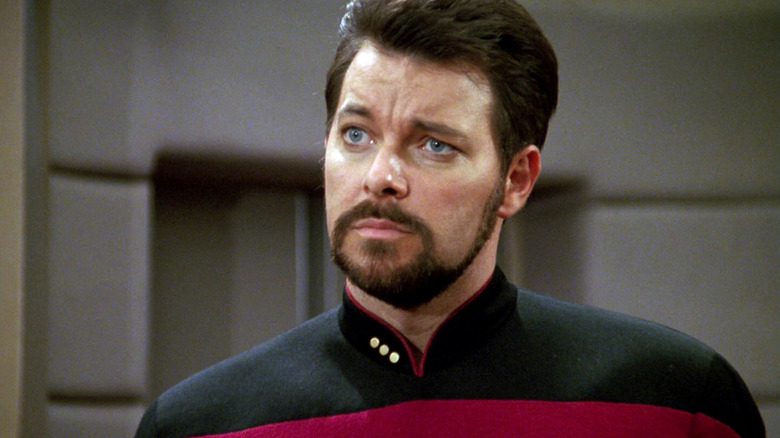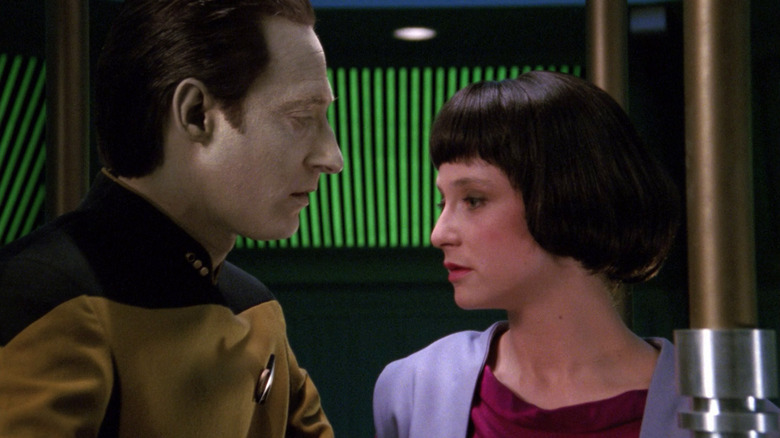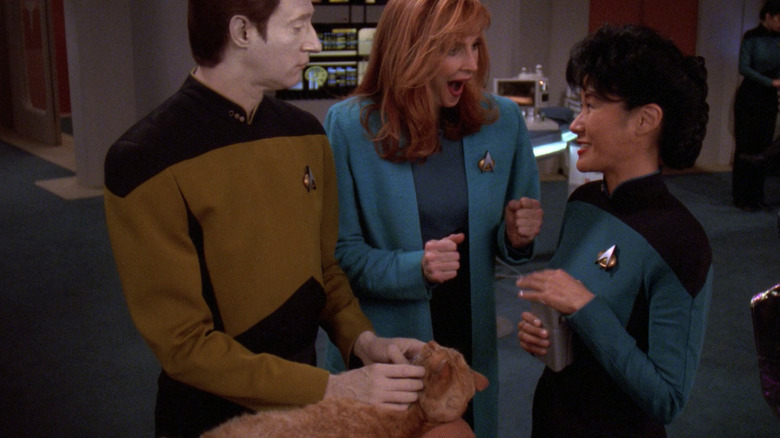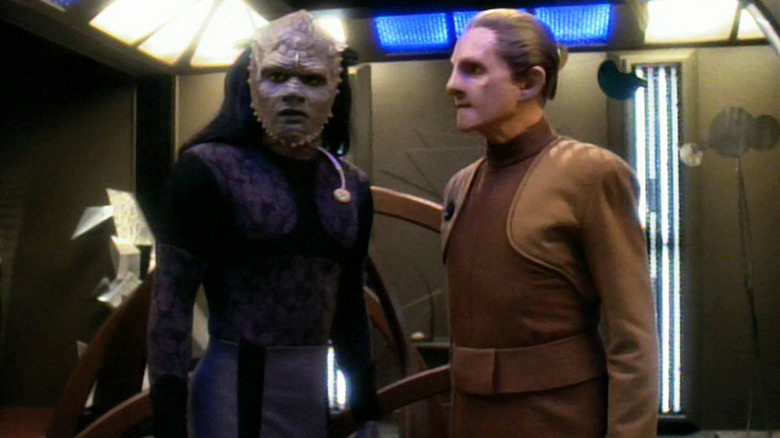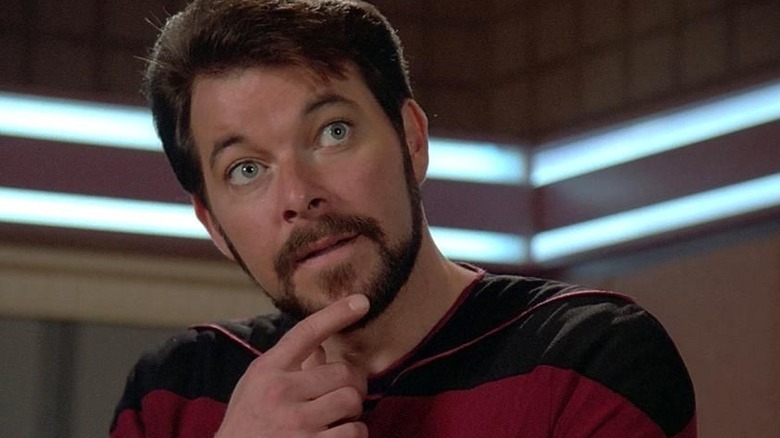Letting Jonathan Frakes Direct Star Trek Came Back To Bite The Show's Producer
Actor Jonathan Frakes' directorial debut on "Star Trek: The Next Generation" was for the third season episode "The Offspring" (March 12, 1990), the episode where Data (Brent Spiner) builds his own android daughter (Hallie Todd). One might note that Frakes' character, Commander Riker, didn't appear much in that episode. This kicked off a full-blown directorial career for Frakes that hasn't slowed since. Frakes directed eight episodes of "NextGen" in total, as well as the feature films "Star Trek: First Contact" (1996) and "Star Trek: Insurrection" (1998).
Frakes would go on to direct "Thunderbirds" and "Clockstoppers," and enter a prolific career helming episodes of high-profile TV shows like "Leverage," "NCIS: Los Angeles," "Burn Notice," and "The Librarians." He also stayed within the Trek family over the years, directing episodes of "Deep Space Nine," "Voyager," "Discovery," "Picard," and the notable crossover between "Strange New Worlds" and "Lower Decks." He even oversaw two episodes of "The Orville," which can likely be counted on his "Star Trek" résumé.
It seems that directing "The Offspring" did more than kick off Frakes' career, however. According to the invaluable oral history book "The Fifty-Year Mission: The Next 25 Years: From The Next Generation to J. J. Abrams," edited by Mark A. Altman and Edward Gross, when Frakes was given the plum directorial gig, other actors on the show began asking for the job as well. While William Shatner and Leonard Nimoy had both directed Trek movies prior to "The Offspring," Frakes allowed a trend to emerge. As of this writing, 13 additional Trek cast members (apart from Frakes, Nimoy, and Shatner) have directed episodes.
Data shows always work
Frakes clearly wanted to direct, as he recalls overseeing a lot of the behind-the-scenes elements of making an episode of "Star Trek: The Next Generation." Frakes had been acting since the mid-1970s (he was on the soap opera "The Doctors"), and was ready to make the leap. He did a lot of studying. When executive producer Rick Berman offered him a Data-centric episode, Frakes was elated. In his words:
"I went to Berman and said I'd like to do a show, and he said you have to go to school. I spent about 300 hours in the editing room and on the dubbing stage and learning about that side of directing. Naturally, I looked over the shoulders of all our regular directors and took some seminars, and read textbooks and, finally, I didn't go away. Rick was kind enough to give me 'The Offspring,' and I was thrilled because I got a Data show and those always work."
Hence, a new phase in Frakes' career began.
Berman, however, suddenly found himself fielding requests from additional "Star Trek" cast members. Evidently, Frakes was capable and confident enough to make others want to try. This never happened with the original series. Eventually, Berman had to grant requests from Patrick Stewart (who directed five "NextGen" episodes), LeVar Burton (who helmed two, plus 26 additional Treks besides), and Gates McFadden (who oversaw that one episode wherein Barclay devolved into a spider). "Jonathan started this ball rolling," Berman explained, "and all of sudden other people started making the request."
And then there was 'Deep Space Nine'
Berman recalled that he was most assuredly uncomfortable letting his actors direct, specifically because he felt they weren't as disciplined as the staff of directors he had on hand. Those of us on the outside might assume that Berman would be thrilled to have experts on the characters — the actors themselves — oversee the show, but that wasn't the case. Berman hated the idea, recalling:
"My feeling was that this was a gift and not something that, as far as actors are concerned, that I owed them. There were some actors during the course of the four series who were not necessarily perfectly behaved in terms of being prepared, being on time, not giving grief to various people that they were working with on the set. I had no interest in giving those people the gift of a directing assignment, but there were others like Gates, LeVar, and Michael Dorn who did direct."
And that, naturally, bled into "Star Trek: Deep Space Nine" which debuted during the penultimate season of "NextGen." Berman let several "DS9" cast members direct ... to dubious results (at least as far as he was concerned). Berman said:
"On 'Deep Space Nine,' a lot of people wanted to direct. And it kept going. Sometimes it was very hard because one of our finest actors, and I'm not going to say who, did a very mediocre job at directing and, in fact, there was more than one. There were maybe two or three actors over the course of the shows who didn't do a great job of directing, and I had no interest in giving them a second assignment. Which was very hard, because these were people I was working with and dealing with on a daily basis."
The Niners
One can only speculate which of the "Deep Space Nine" actors Berman considered to be a mediocre director. And there are a lot to choose from, as Avery Brooks (Captain Sisko) directed nine episodes, René Auberjonois (Odo) also directed nine, Michael Dorn (Worf) directed three, Andrew Robinson (Garak) handled three, and Alexander Siddig (Dr. Bashir) helmed two. Also notable: Frakes directed three "Deep Space Nine" episodes and Burton did nine. Berman, it seems, was not impressed by at least one of these people.
He was more comfortable with — and Berman was very frank about this — giving directing gigs to those who were already on the production side of things. He also called out some of the actors-turned-directors that he was proud of, notably of their work on episodes on "Star Trek: Voyager." It seems it took Berman a long time to even warm to the idea of an actor who directs. He said:
"When it came to some of our production people, an assistant director, like a Les Landau, these were people who were completely qualified to direct. Giving them directing assignments was no big deal. People like David Livingston, who came and asked to direct, was incredibly knowledgeable and incredibly studious and did a wonderful job. There were times when I felt with people like Jonathan, and Roxann [Dawson], and Robbie McNeill, where I felt really proud of having given them assignments and seeing the remarkable work they did."
David Livingston previously worked as a line producer. Roxann Dawson played B'Elanna Torres on "Voyager," and Robert Duncan McNeill played Lieutenant Tom Paris. Regret, Berman recalled, occasionally set in. "[T]here were times," he said, "Where I wished I had never done it and it came back to bite me in the ass."
Thank you, Rick
Frakes acknowledged that his request to direct really did open the floodgates, and joked about how he made life difficult for Rick Berman. He was grateful, of course, but also knew what he did. Frakes noted:
"I thank Rick for giving me the opportunity, which I'm sure he regretted since everyone in the world beat down his door. He's given editors, A.D.s, actors their shot, and it came back to haunt him. I heard the caterer was looking to direct an episode."
Both Berman and Frakes noted that casting actors "came back to haunt him" or would "bite me in the ass." Looking over the directorial filmographies of each of the above-listed actors, one can't find too many outright stinkers ... except for one. It seems that Alexander Siddig directed the "Deep Space Nine" episode "Profit and Lace," a "dress in drag" comedy episode wherein Quark (Armin Shimerman) underwent gender affirming surgery for business reasons. "Profit and Lace" is often held up as one of the worst episodes of the series. One can't necessarily pin its low quality on Siddig — the writers likely take more blame — but it is one of the few times an actor directed "Star Trek" and something notorious came of it.
Well, that, and William Shatner's notoriously bad "Star Trek V: The Final Frontier," the movie about the Enterprise flying to the center of the galaxy to meet God in person. But that came out before Frakes started knocking on Berman's door.
